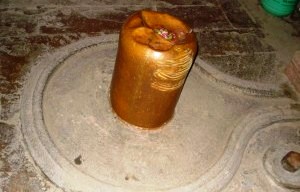AGNEESHWAR
Once there lived a pious Brahmin called Vishwanar alongwith his wife Suchishmati. After due prayers, they were blessed with a male child. The child was named Grahapati by all elders and eminent personalities.
Vishwanar performed all the sanskars (rituals) connected with child birth and upbringing of a child. Upanayan Sanskar of Grahapati was performed at the age of five and he was given Brahmopadesh. The boy learnt all the vidyas from his Guru/father.
One day Sage Narad visited their house and was overwhelmed by the hospitality extended by Vishwanar and his family. Sage Narad made Grahapati sit on his lap and examined him in detail. Afterwards, Narad told the parents that the child had all the indications of a Raja Yog and all parts of his body, his mannerisms etc. pointed out to that. But at the age of twelve, he will have to face a very serious threat to his life by Lightning (Agni). After saying this, Sage Narad left their place.

(AGNEESHWAR)
On hearing this, both the parents were taken aback. Vishwanar fainted and his wife started weeping bitterly. On seeing their parents’ plight, Grahapati told them that he will go to Kashi and start worshipping Lord Shiva in his form of Mrityunjay. He came to Kashi, took bath in Manikarnika Teerth and worshipped Lord Vishweshwar.
Soon Grahapati installed a Shiv Ling and started performing intensive Tapas to please Lord Shiva. He performed abhishek with 108 pots of Ganges water on this ling and performed various poojas and archana with flowers and other ingredients. He was on fast for several months at a stretch and this went on for two consecutive years till he attained the age of 12. The danger time, prescribed by Sage Narada had approached.
Lord Indra appeared before Grahapati and offered him a divine wish. Grahapati respectfully stated that he was worshipping Lord Shiva and the latter can only grant him any wish or blessing and none else. Lord Indra claimed that he was the only God who could bless him. Grahapati again politely repeated his words, which infuriated Lord Indra to such an extent that he attacked Grahapati with Vajraayud (thunderbolt). Grahapati on account of the above attack, fell down unconscious.
Then Lord Shiva appeared before him and woke him up. Grahapati woke up as if he was awakened from a deep sleep and saw Lord Shiva in person standing before him. Lord Shiva told Grahapati that the latter was put to test. None of the devotees of Lord Shiva need to fear from any one as they are under the protection of the Almighty. He told Grahapati that the latter would have the status of Deva.
The Ling installed by Grahapati will henceforth be known by the name of Agneeshwar Ling. A devotee who worships Agneeshwar Ling will not have any fear from lightning or fire. He will not be faced with Akal Mrityu (untimely death). If a person performs pooja etc. of Agneeshwar in Kashi, he will reach Agni Lok even if he dies elsewhere. After saying all this, Vishweshar disappeared into the Agneeshwar Ling. (Kashi Khand, Chapter 11).
——————————————————————————————————-
Kashi Khand, Chapter 11, Shlok 159
अग्नीश्वरं समभ्यर्च्य काश्यां सर्वसमृद्धिदम्
अन्यत्रापि मृतो दैवादग्निलोके महीयते
Agneeshwar, bestows all success and achievements to devotees in Kashi. A divine devotee of Agneeshwar in Kashi resides respectfully in Agni Lok, even if he dies in any other place.
———————————————————————————————————
LOCATION OF THE TEMPLE
The temple is located at House No. Ck.2/1, Patani Tola, Bhosala Ghat, Varanasi. One can travel upto Chowk by Cycle Rickshaw and walk to this place via Sankata Devi Temple (famous landmark). Alternatively, devotees can approach the place by boat upto Bhosale Ghat/Ganesh Ghat near Mehta Hospital and climb up the steps.
TYPES OF POOJAS
The temple is open from 07.00 am to 9.00 a.m. and in the evening from 06.00 p.m. to 10 p.m. Special poojas are performed on important days like Shivratri and certain Ekadasi days. Devotees can perform pooja as per their convenience.




